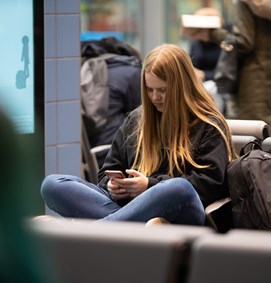A month in news: five stories on children's rights, wellbeing and challenges from August
- Date: 13 September 2023
- In: UK
Record high figures for children in mental health crisis and online grooming crimes made headlines, as well as worrying numbers of excluded pupils at risk of criminal exploitation. Meanwhile, charities campaigned for children’s voices to be at the centre of the Covid-19 inquiry, with the month’s news culminating in a flurry of reports about plummeting exam grades and the growing number of children missing school.
What wasn’t as widely reported on – except for a few thought-provoking opinion pieces – was how all of these issues are intertwined.
Below, we take a closer look at the news stories concerning children and young people from August:
The BBC reported that hundreds of vulnerable young people who are at risk of criminal exploitation are being excluded from school in the West Midlands. According to figures from the File on 4 documentary series, there were almost 600 exclusions of pupils known to be targets for criminal gangs in the region between 2021 and 2023.
In the West Midlands, Railway Children have worked with several young people who have had issues remaining in education and have at some point been at risk of criminal exploitation. A common problem we see is that when school placements fail, the focus is on the behaviour rather than safeguarding concerns, which we aim to address by working with teachers and through trauma-informed interventions.
School is often a safe place where staff can monitor and raise concerns. If a pupil is missing or excluded from education and there are little or no safeguarding responses from a parent or caregiver, the risk of being exploited is significantly higher. Young people in these situations can experience fear, pressure, threats of violence and coercive control – understanding these vulnerabilities and the reason behind the behaviour is crucial to reduce risk.
It was reported last month that the number of children struggling with their mental health in England hit a record high. According to analysis of NHS data by mental health charity YoungMinds, there were more than 3,500 urgent referrals of under 18s to mental health crisis teams in May, which is three times higher than May 2019.
We provide emotional support to those who are struggling with their mental wellbeing while working closely with mental health services, including CAMHS and Samaritans, to ensure their needs are being met.
Our focus on mental health also extends to the rail industry. This year, we’ve trained 25 rail staff in Mental Health First Aid (MHFA) to not only provide better support vulnerable children and young people on the transport network but to improve the culture within organisations. We also run forums after MHFA training to check in with staff and support best practice.
Tens of thousands of online grooming crimes have been reported to police in the wait for the Online Safety Bill to become law. According to police data analysed by the NSPCC, 6,350 offences related to sexual communication with a child were recorded last year. The data shows that 73% of the offences involved Snapchat and Instagram, with 5,500 crimes taking place against children of primary school age.
Thanks to ongoing campaigning, the government has strengthened child protection measures within the legislation. However, online grooming cases have risen at an alarming rate during ongoing delays and amendments.

After initial online conversations, groomers will often lure vulnerable individuals to face-to-face meetings where they become at risk of further harm. We aim to reach children and young people on these initial journeys by building a robust safety net across the UK transport system, and through one-to-one sessions, support them to make informed choices and end exploitative relationships.
We welcome new online safety laws that will bolster protection for children at risk of exploitation, and hope the government remains committed to keeping them safe.
The Covid inquiry has been criticised by children’s charities and experts for failing to include children’s voices. An open letter to the inquiry chair included a warning of ‘unacceptable delays’ to taking evidence from children about their experiences during the pandemic.
We know that lockdowns had a lasting impact on children’s wellbeing, education and social development, as well as putting additional pressure on families. A meaningful inquiry into how the pandemic has impacted children would help us – and others who work with young people – to better understand how they can be supported.
Our Youth Participation Forum provides the opportunity for them to influence how we work and the systems we operate in while sharing their experiences, feelings and stories.
The education secretary was criticised for her comment that no one would be interested in pupils’ exam results in 10 years while responding to falling exam grades. Gillian Keegan was accused of adding ‘insult to injury’ for the government’s failure to support young people after the disruptions they faced during the pandemic. Compared to last year, five thousand fewer students were awarded three A* grades in A-levels, while more than 200,000 fewer top GCSE grades were given out as exam boards returned to pre-pandemic grading.
Railway Children works with schools, families and other agencies to ensure that young people are supported with their education. As well as focusing on their achievements, we take the time to understand how other factors – such as additional learning needs, challenging family circumstances and poor mental health – can affect school life.